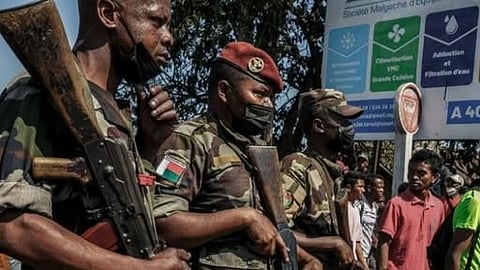

Madagascar's presidency issued a stark warning on Sunday, declaring that an attempted illegal and forcible seizure of power was underway in the African nation.
The announcement came amid deepening unrest, as troops from the elite CAPSAT unit joined a youth-led protest movement that began last month.
This development marks the most serious challenge to President Andry Rajoelina's rule since his reelection in 2023.
The protests, which erupted on September 25 over shortages of water and electricity, have since broadened into widespread demands for political change.
Demonstrators are calling for Rajoelina to step down, apologize for violence against protesters, and dissolve the Senate and electoral commission.
Inspired by Gen Z-led movements in Kenya and Nepal, the demonstrations have drawn global attention, with some participants wearing T-shirts and flags featuring a skull with a straw hat from the Japanese manga series "One Piece," a symbol also used in youth protests in Indonesia and Peru.
Tensions reached a new peak on Saturday when CAPSAT soldiers, the same unit that aided Rajoelina's 2009 coup, urged fellow troops to disobey orders and support the protesters.
Videos circulating on social media captured CAPSAT members calling on soldiers to back the people.
Dozens of troops subsequently left their barracks to escort thousands of demonstrators into May 13 Square in Antananarivo, a site historically linked to political uprisings that had been heavily guarded and restricted during the unrest.
On Sunday, CAPSAT officers claimed command over the country's security operations, announcing they would coordinate all military branches from their base on the capital's outskirts.
They appointed General Demosthene Pikulas as head of the army.
Adding to the disarray, a unit of the paramilitary gendarmerie, previously aligned with police in managing the protests, broke ranks with the government.
In a statement broadcast on Real TV, the Intervention Forces of the National Gendarmerie stated:
All use of force and any improper behaviour towards our fellow citizens are prohibited, as the gendarmerie is a force meant to protect people and not to defend the interests of a few individuals.
The unit said it was coordinating with CAPSAT headquarters.
Spokespeople for the defense ministry and military general staff declined to comment.
A Reuters witness reported three people injured after shots were fired along a road to the CAPSAT barracks on Sunday, though other observers noted no signs of ongoing clashes.
Thousands convened peacefully in Antananarivo on Sunday to protest the government and honor a slain CAPSAT soldier, whom the unit alleged was killed by the gendarmerie the previous day.
The gathering included church leaders, opposition politicians such as former president Marc Ravalomanana, and CAPSAT troops.
In response, Rajoelina's office condemned efforts to destabilize the country and urged dialogue to resolve the crisis.
The African Union commission's chief, Mahmoud Ali Youssouf, welcomed the government's renewed commitment to dialogue and called for calm and restraint.
Rajoelina's whereabouts remained unknown on Sunday, but his office stated late Saturday that he and the prime minister were fully in control of national affairs.
The gendarmerie emphasized that its orders would come exclusively from the National Gendarmerie Command Center.
As rival forces vie for control of security operations, the crisis underscores deepening divisions in Madagascar's political landscape.